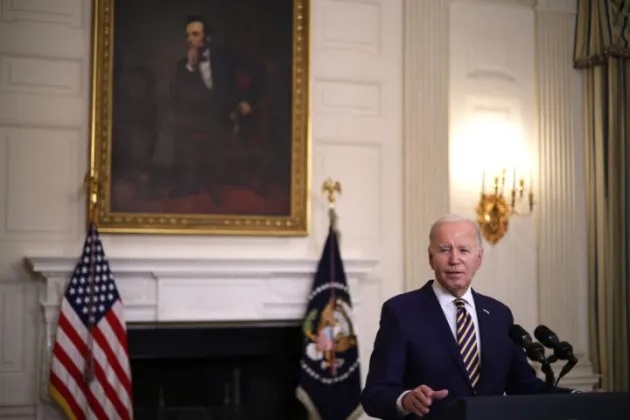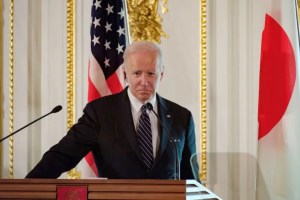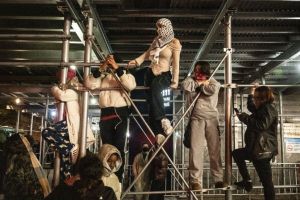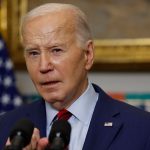The Biden administration is planning to announce sanctions against a part of the Israeli Defense Forces. On the one hand, this would be the latest in a series of US and European sanctions targeting Israeli settler organizations linked to violence against Palestinians. On the other, it’s an unprecedented legal action by the United States against the Israeli military itself.
One of the long-running divisions in Israel society is between Haredi (ultra-Orthodox) Jews and the rest of the public. Originally a tiny minority, Haredi Jews now form nearly 14 percent of Israel’s population. The biggest tension is over the issue of military service: while most Jewish men are drafted into the IDF at eighteen by law, Haredi men are exempt. Courts have repeatedly ruled that the exemption is discriminatory, and Israeli governments have tried to show judges and the wider public that they’re working on increasing Haredi draft numbers through non-coercive means.
To most Israelis, sanctioning any part of the IDF during Israel’s worst war in decades is a wedge too far
The Netzah Yehuda battalion was created for this purpose. One of the big Haredi objections to military service was that the IDF was too much of a temptation: their youths would be exposed to women, non-religious Jews and secular ideas. Netzah Yehuda was supposed to be a “safe space” for Haredi men, with a focus on religious observance and extra-strict kosher food. The hope was that, with special provision for their cultural needs, Haredi enlistment would rise.
It was a failure. Netzah Yehuda struggled to get the eye-catching enlistment statistics that the IDF and government needed. So instead of the Haredi community, they began to look elsewhere for recruits.
The most extreme Israeli settler groups, often known informally as the Hilltop Youth, are made up of political religious zealots. Often involved in vandalism and violence against both Palestinians and Israeli security services, many have already been in trouble by their mid-teens. The IDF doesn’t like to draft Hilltop Youth types, considering them too much of a risk, which also adds to their sense of isolation from wider society.
The Hilltop Youth aren’t Haredi. But many of their religious needs are very similar: no women, the strictest levels of religious observance, etc. So the IDF started to fill Netzah Yehuda with youths from this community, settler kids that wanted to serve but that the rest of the army didn’t want to touch. On paper, “Haredi enlistment” was up and suddenly the program looked like a success.
Unsurprisingly, a brigade with a large number of ideologically-motivated extremists was a potential source of trouble, which makes the next decision hard to understand: Netzah Yehuda was stationed in the West Bank, protecting the same settlements and outposts from which many of its members hailed. In several documented incidents, Netzah Yehuda soldiers were accused of mistreating Palestinians, including beatings, sexualized violence, electrocution and harassing Israeli protesters. Netzah Yehuda members have been convicted of some of these offenses, serving time in military prison or ordered to pay compensation.
In January 2022, Omar Assad, a seventy-eight-year-old Palestinian-American dual citizen, was detained by Netzah Yehuda troops and left bound and gagged on his stomach for up to an hour. When the soldiers returned, he had died of a heart attack. The Biden administration took an interest in the case, pushing Israel for answers and opening an initial investigation under the Leahy Law.
The Leahy Law is a granular bit of legislation that bans military support to specific army units of US allies, when the unit is credibly implicated in human rights violations. Because it blocks US aid to these units, it’s a law that effectively only applies to allies, who are the ones getting the aid in the first place. Last year, the Australian SAS was investigated under the Leahy Law after allegations of war crimes in Afghanistan.
The IDF reassigned Netzah Yehuda away from the West Bank altogether in December 2022, but the damage seems to have been done. If Barak Ravid, the Israeli reporter now on the White House beat who broke the story, is correct, any day now the Biden administration will effectively announce its first sanctions against a part of the Israeli military.
These aren’t criminal sanctions. They would only prevent the battalion from receiving US money and equipment. But the move, still not officially announced, is already provoking a strong reaction in Israel. It has been condemned not just by prime minister Benjamin Netanyahu but also by centrist minister Benny Gantz and opposition leader Yair Lapid.
In the last few months, the US has led Western efforts to target Israeli settler groups that have been linked to violence. The UK and EU have followed the Biden administration’s lead, imposing travel bans and financial freezes on some of the most extreme individuals and organizations. These moves haven’t been particularly controversial in broader Israeli society, and seem to be part of a wedge strategy by the US administration designed to isolate the Israeli far-right.
To most Israelis, though, sanctioning any part of the IDF during Israel’s worst war in decades is a wedge too far. The subtleties of Netzah Yehuda versus other battalions has been lost in translation, and all the public is hearing is that Biden, who helped foil last week’s massive Iranian missile attack, is now turning on Israel.
Since it was reassigned out of the West Bank, reports of abuses by Netzah Yehuda soldiers have all but vanished. The sanctions proposed by the US are focused, understandably, on past behavior rather than the future. But after panicked calls from Israeli leaders to their US counterparts, I wonder if the Biden administration might reconsider, and direct its sanctions in a way that serves to unite Israelis against the far-right, rather than unify them in support of the IDF as a whole — including Netzah Yehuda.
This article was originally published on The Spectator’s UK website.


















